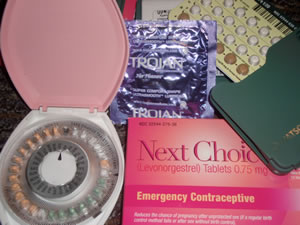ZNFPC celebrates World Contraceptive Day

By Donald Dube ZNFPC
World Contraception Day WCD is a global campaign with a vision to ensure that every pregnancy is wanted.Its mission is to improve awareness of contraception with more emphasis on enabling young people to make informed decisions on sexual and reproductive health and rights.
The campaign was launched in 2007 by the European Society of Contraception (ESC) with the major concern focusing on the fact that a majority of teenage pregnancies were unplanned and every year people get infected with Sexually Transmitted Infections (STIs) due to inadequate information on how to protect themselves.
The event is held on the 26th of September every year. WCD is using an umbrella theme for this and future years: ‘It’s your life; it’s your future; know your choices’. Zimbabwe National Family Planning Council (ZNFPC) commemorates World Contraception Day by offering free Family Planning services at its Spilhaus and Fife Avenue Clinics in Harare on the 26th of September 2017.
Methods of family planning are classified into three broad categories namely Short-acting, Long-acting and Permanent methods.
Under the Short-Acting Methods are contraceptive pills, injectable, condoms and Fertility Awareness Based Methods. Long-Acting Reversible Contraceptives include implants and Intra Uterine Contraceptive Device. For permanent methods there is tubal ligation for women and vasectomy for men.
Short-Acting Methods
1. The Pill is a short-term hormonal contraceptive taken by women to prevent pregnancy. It prevents maturing of the egg. One (1) pill must be taken by mouth each day at the same time, to make it work. In Zimbabwe there are two types of pills in the public sector namely: Combined oral contraceptives (e.g. Control and Marvelon28) and Progestogen only pill (e.g. Secure). When taken regularly and correctly, the pill is a very effective method of preventing pregnancy.
2. The male condom is a thin sheath of rubber used by a man to prevent his partner or wife from becoming pregnant. The male condom is a dual protection method. This means that apart from preventing unintended pregnancy if correctly and consistently used, it can also prevent Sexually Transmitted Infections (STIs) including HIV.
The female condom is a thin sheath or pouch worn by a woman during sexual intercourse.
It provides continuous lining of the vagina which inhibits exchange of sexual fluids hence preventing pregnancy and STIs including HIV.
3. Injectables are hormonal contraceptive methods injected to women by a trained health care provider once periodically depending on type e.g. (Depo Provera / Petogen). The injectable does not affect the quantity and quality of breast milk in breastfeeding mothers and is effective for most women as long as she does not default.
4. Fertility Awareness Based Methods
Lactational Amenorrhea Method (LAM) – for breast feeding mothers. This is a natural method of preventing pregnancy for a woman who is exclusively breastfeeding for up to six (6) months after child-birth. A breastfeeding woman uses LAM when:
Her baby gets little or no food or drink, except breast milk and she breastfeeds often, both day and night.
Monthly bleeding has not returned after child birth.
Her baby is less than six (6) months old.
A woman should plan to take up another method before the end of the effective period which lasts up to six (6) months after child-birth.
Long-acting reversible methods Implants
Implants are small contraceptive plastic rods which are inserted under the woman’s skin, usually on the inner part of the upper arm. An Implant is a long-acting reversible contraceptive, highly effective in preventing pregnancy. It can be used by almost any woman who is in good health.
There are two types of implants
a) Jadelle (Progestogen-Only-Contraceptive) – Jadelle is a TWO rod implant which is long-acting, reversible and highly effective in preventing pregnancy for up to five (5) years.
b) Implanon (Progestogen-Only-Contraceptive) – Implanon is a ONE rod implant which is long-acting, reversible and highly effective in preventing pregnancy for up to three (3) years.








Comments